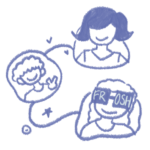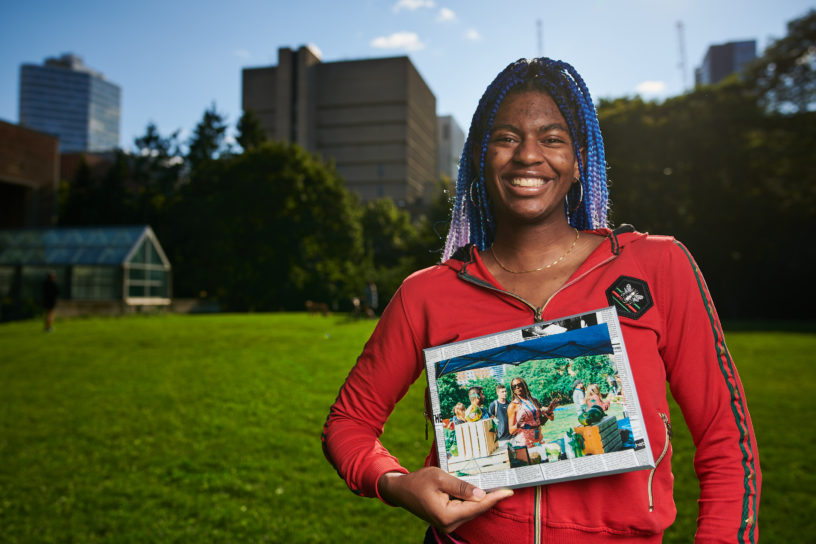By Adriana Fallico
When Sonnet Hines made the decision to attend Toronto Metropolitan University’s (TMU) orientation week as an incoming student two years ago, she knew she had to go to as many events as she could.
Despite the uncertainty and nerves around going to orientation events, Hines’ experience made a notable impact.
“It was an absolute blast,” she said. “Every day I’d be up from nine in the morning and come back at 11 at night.”
“My whole process was I’d look on the orientation website and I’d plan out my day because I wanted to go out for the whole day. I was booking everything into my calendar,” she said.
Now beginning her third year in the professional communications program, Hines looks back at these experiences with a smile.
“I still have friends from orientation, so there’s that lasting impact,” she said.
According to the Student Life and Learning Support’s (SLLS) website, the goal of TMU Orientation Week is to give “the chance to connect with other students, get familiar with your academic program and get to know your way around campus.”
For the 2024–2025 school year, the fall semester’s orientation week—commonly referred to as frosh—will start from Aug. 25 to Sept. 2, while winter orientation takes place in January 2025.
“The brain hears a lot about novelty and uncertainty, you may as well make it as good of an experience as possible”
Andrew Metcalfe, TMU’s orientation and campus events facilitator, said frosh is unlike any other of the school year.
“Campus has a really awesome buzz to it,” said Metcalfe. “People are excited, there’s always music playing, there’s tables set up with different campus organizations.”
However, the start of one’s university journey is not linear for all students. Karl Szpunar, an associate professor of psychology noted this start represents a “very critical change.”
“The jump we make when we go into undergrad is the beginning of a very important lifetime period that is very new,” he said. “Anything we can do to help to adjust ourselves, to help us with what we are getting into I think is a very good thing to do.”

TMU’s downtown Toronto location differs from a classic university setting and creates a modified version of frosh—raising the question of whether these events are worth it.
However, orientation has proven itself to be an effective introduction to university life.
Orientation signals the start of a new school year—which can be a transition not all students are prepared for.
Szpunar, also the director of psychological science training at TMU, identifies these transition periods as a “cultural life script.”
“When we embark on these cultural periods, because it’s so novel, you’re going to remember it,” he said. “The brain hears a lot about novelty and uncertainty, you may as well make it as good of an experience as possible.”
Metcalfe also understands how making it to orientation can be “a large barrier,” especially for commuter students.
“I understand not wanting to make the commute,” he said. “I know for a lot of our students it’s a huge burden. You are paying 12 bucks one-way on the GO train to get to campus, plus two hours of your life.”
Despite this, orientation can be more than fun music, colourful tents and free merchandise.
“I can connect with them on the same level because It feels familiar to home”
Divisha Shardha, a second-year fashion design student, attended three days’ worth of events during her own frosh week last year. She had just arrived in Canada from Pakistan, instantly immersing herself into the university environment.
She focused on attending events centred around campus housing and resources for international students. An event organized by the International Student Support (ISS) resonated with her deeply. Through it, Shardha learned that several students there were not only living in the same building as her but on the same floor.
She felt this connection helped her overcome the homesickness she was feeling at the time.
“The first thing I thought was: oh, I can connect with them on the same level because it feels familiar [to home].”
The events she attended helped to ease her into life in a new city around new people.
“Those three days of orientation were so helpful because I got to meet a lot of my floormates, people from different buildings and all the international students,” she said.
Shardha felt the connections she made helped bring her closer to the school, even if they did not stay in touch for long.
“This was my first time travelling alone…the first few weeks were very overwhelming but getting to meet new people and finding them from your home country, neighbouring countries or even just a sweet person, it felt quite good,” said Shardha.

While first-years take part in activities planned for them, older students help to facilitate and run events during this time.
Ram Kanakamedala, a third-year computer science student and current orientation events lead for ISS, takes pride in facilitating events for students in a similar position as he once was as a first-year.
One event he helps prepare is called “From Toronto, With Love: Undergrad & Grad,” where students write letters to their families and mail them back home.
Kanakamedala only attended this orientation event in his first year. To this day, he remembers it fondly and kept the letter he wrote.
Metcalfe emphasized that orientation week can provide students the chance to “build their social networks.”
“I often find that TMU could feel lonely, where folks pack up, come to campus, do their classes and immediately come home,” he said. “It’s hard to make friends, so I find orientation week provides this really unique opportunity where you have all these people on campus together.”
“If I did not go to orientation, I don’t know if I would be the person I am today”
Not only can orientation be a vital chance to forge connections, it can also help provide career opportunities.
Isha Sidhu, a third-year business management student, attended various residency-based events, the Ted Rogers School Orientation Commerce Frosh and more before starting her first year.
The following year, she volunteered at frosh and in May 2024, she joined the SLLS team as an orientation crew lead, saying it “blows my mind everyday.”
When looking back at her first year, Hines believes her orientation experience had a long-term impact on herself.
“Orientation week was one of the many opportunities where I could be myself and show my positive energy,” she said. “That was the beginning of my growth as a student at TMU, because if I did not go to orientation, I don’t know if I would be the person I am today.”












Leave a Reply